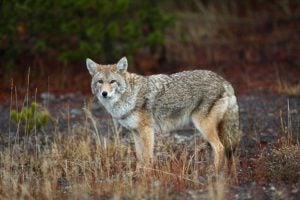
WASHINGTON—Canada Goose has announced in a new report that from 2022 it will no longer buy fur from trappers and instead will use reclaimed fur in its products. Animal protection organisation Humane Society International welcomes the announcement as ‘another nail in the coffin for the fur trade’ but hopes for a ‘cleaner and clearer’ no-fur policy from the company in the near future.
PJ Smith, director of fashion policy at the Humane Society of the United States, said, “While we congratulate Canada Goose for taking this step, and are happy to see yet another nail in the coffin for the fur trade, switching to ‘reclaimed fur’ feels like an unnecessarily long-goodbye for this company’s outdated relationship with fur; ultimately their future must be fur-free. We urge Canada Goose to make a cleaner and clearer commitment to sustainability by switching to bio-fake-furs, and closed-loop recycling of faux fur materials. We hope in the near future to see Canada Goose following the vast majority of top designers in cutting all ties with cruel and outdated fur.”
Rebecca Aldworth, executive director of Humane Society International/Canada, said, “Fur trapping results in prolonged animal suffering, amputation and death for target and non-target wild and companion animals. Notably, the traps used throughout North America are banned in many other countries for animal welfare reasons. Canada Goose’s announcement that it will shift from new to reclaimed coyote fur is a partial victory for animals. However, significant clarification is required about the company’s definition of ‘reclaimed fur,’ its certification methods and its timeline for implementation. Consumers must carefully scrutinize the implementation of this new policy but ultimately we urge Canada Goose to stop using animal fur entirely in favour of humane and environmentally friendly alternatives.”
Canada Goose is infamous for selling garments trimmed with coyote fur from animals caught in cruel leg-hold traps. The company’s continued use of fur has led to global criticism and protests from leading animal groups over the last decade.
Wild animals such as coyotes and wolves who are trapped for their fur, can languish in agony in cruel traps for hours or even days before dying from dehydration, starvation, attacks by predators or being killed when the trapper returns. Animals on fur farms fare no better; in addition to the physical and psychological torment of being confined in small, barren cages for their entire lives, the killing methods typically used on fur farms are equally distressing. Mink are killed by gassing, and fox and raccoon dogs are killed by electrocution.
Humane Society International and the Humane Society of the United States have long fought the global fur trade, eliminating the demand for fur products around the world by working closely with top designers and retailers to go fur-free and banning fur sales in cities and states. In the UK, HSI leads the #FurFreeBritain campaign to ban fur sales countrywide.
Since the beginning of 2017 alone Burberry, Versace, Gucci, Chanel, Coach, Donna Karan, Prada, Miu Miu, Church’s, Michael Kors/Jimmy Choo, Diane von Furstenberg, Columbia Sportswear, Farfetch, Yoox Net-a-Porter, Burlington, VF Corporation (Timberland/The North Face) Furla and Bottega Veneta, have all stopped using fur in their collections.
END
Media contact: Wendy Higgins, whiggins@hsi.org
